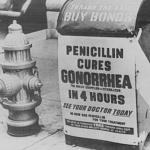If you're worried about never-ending wars, crippling national debt, poverty, disease, social unrest, or even really bad stomach aches, the anti-GMO movement is here to tell you about another troubling threat: ice cream made in
allergy
Every time I go to the doctor's office, I'm asked if I'm allergic to anything. "Penicillin," I say, dutifully. And I've been saying that every year since I can remember.
Anyone who has ever been subjected to an allergy skin prick test can verify that it is not a pleasant procedure, particularly if you happen to be allergic to several different substances.
Researchers have been working for years to find a means of treating peanut allergy with various degrees of success, as we wrote about here.
On my recent flight to New York City, an attendant announced that a passenger had a severe peanut allergy. If any of us had brought food containing peanuts, it was requested that we put it away for the entire flight.
Peanut allergies range from inconvenient to potentially fatal. The cause is unknown, but it is likely to involve a combination of immunogenetic and environmental factors.
Allergy to cow's milk is not well understood*.









